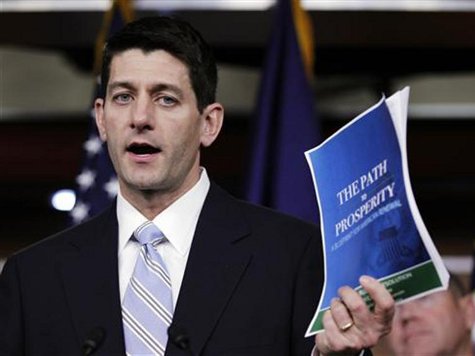
The Democrats have been so derelict in their duty to introduce or pass a reasonable budget, apparently any attempt to pass a budget is considered “controversial.”
The Los Angeles Times ran a piece, prior to the U.S. House passing Rep. Paul Ryan’s budget, with an opening graph that was impossible to distinguish from an op-ed:
Doubling down on a controversial campaign issue, the GOP-led House is set to approve a 2013 budget that would cut taxes for the wealthy, revamp Medicare and slash federal spending in a vote that will define the Republican Party this election year and beyond.
This one paragraph sums up the more prescient major policy difference between Republicans and Democrats.
Democrats never deviate from their standard playbook talking point, which states that all Republican-proposed tax cuts are for the wealthy. The reality is the Ryan plan simplifies the tax code into two brackets, 10% and 25%, while repealing the Alternative Minimum Tax (AMT). Calling this proposed reform a tax cut for the wealthy is patently absurd.
Furthermore, Ryan’s plan tackles tax loopholes:
The tax code is patently unfair: Many of the deductions and preferences in the system – which serve to narrow the tax base – were lobbied for and are mainly used by a relatively small group of mostly higher-income individuals.
The potentates of class warfare and divisiveness, today’s Democrats apparently failed to read and/or comprehend the significance of this statement. The over-arching concept of the Republican tax reform plan is fairness. That implies everyone should pay taxes and that everyone should be treated equally under the tax code.
Further policy divergences revealed in the opening graph include two of the most important issues of our time: 1) overhauling Medicare (and entitlements in general) and 2) cutting federal spending. Democrats have proven over and over that they are unwilling to consider serious measures to address these burgeoning crises. They are happy to use them for political rhetoric, but beyond that are utterly gutless with regard to dealing with them.
Thursday’s 228-191 party-line vote comes as a heated debate is playing out in Congress and the campaign trail, where Mitt Romney has embraced the proposal in sharp contrast to President Obama’s approach to budgeting. No Democrats voted for the measure, but 10 Republicans voted against it – more than last year.
It’s almost as if the author of this piece is surprised that a Republican presidential candidate would be averse to the president’s approach to budgeting; assuming presenting budgets even your own party won’t cast a vote for, not once but twice, is “budgeting.” It is amusing that the author chose to highlight the party-line vote on the Ryan plan, trumpeting the 10 GOP nay votes, while ignoring the zero votes the president’s budgets have received.
Neither the Ryan budget nor the one proposed earlier this year from the White House, which raises taxes on the wealthy to trim deficits, is expected to be approved by this divided Congress, rendering them more campaign manifestos than blueprints for governing.
This notion of closing the budget deficit gap on the backs of the wealthy has been so thoroughly dispelled as to make its mention laughable. Even worse for Democrats, Americans reject class warfare, yet it is has been a Democrat trick for so long they consider it a hill worth dying on.
However, a more immediate threat of government shutdown could emerge with the new fiscal year, Oct. 1, because the House budget sets a lower level of federal spending for domestic programs than was agreed to with the White House.
That agreement was made during last summer’s debt ceiling deal, and neither the White House nor the Democratic-led Senate is likely to go along with the GOP’s new level of cuts — presenting a standoff that would need to be resolved to keep the government running.
“This budget should be called the road to austerity,” said Rep. Carolyn Maloney (D-N.Y.), during the floor debate. “Harsh austerity.”
Rep. Gerald Connolly (D-Va.) said the GOP budget “seems to value only cruel Darwinism.”
These passages could not be any more revealing with regard to which side of the political spectrum is serious about controlling government spending and approaching the budget from a logical and sane fiscal perspective. Needless to say, that side is not the left. Profligate spending and fiscal irresponsibility have become their policy trademark.
The House also gave a nod to alternatives – including the first-ever congressional vote on a proposal modeled after the president’s Fiscal Commission headed by former officials Erskine Bowles and Alan Simpson.
That proposal provided perhaps the most balanced approach to the nation’s fiscal problems by cutting spending and increasing tax revenue as a way to rein in what experts say are alarming levels of debt. It was rejected late Wednesday even with just 38 votes in favor.
The Progressive Caucus presented a proposal that would cut deficits lower than Ryan achieved largely by hiking taxes on individuals and Wall Street transactions. The top individual tax rate would spike to 49% for those earning beyond $1 billion a year, and a 0.5% surtax would be imposed on household wealth above $10 million. A vote was expected Thursday.
The author goes on to discuss the merits of the Bowles-Simpson budget plan and the Progressive Caucus plan, both of which fail miserably to address the real issue of out-of-control spending.
Today’s Democratic Party and their leftist associates, including many in the media, are unable to grasp the seriousness of the situation, the magnitude of the budgetary crisis, the impact of the unsustainable debt levels, or the required measures to repair them. The fact that passing a budget with spending cuts is “controversial” should discredit any “solutions” Democrats present until they demonstrate a modicum of sanity with regard to these fiscal matters.

COMMENTS
Please let us know if you're having issues with commenting.